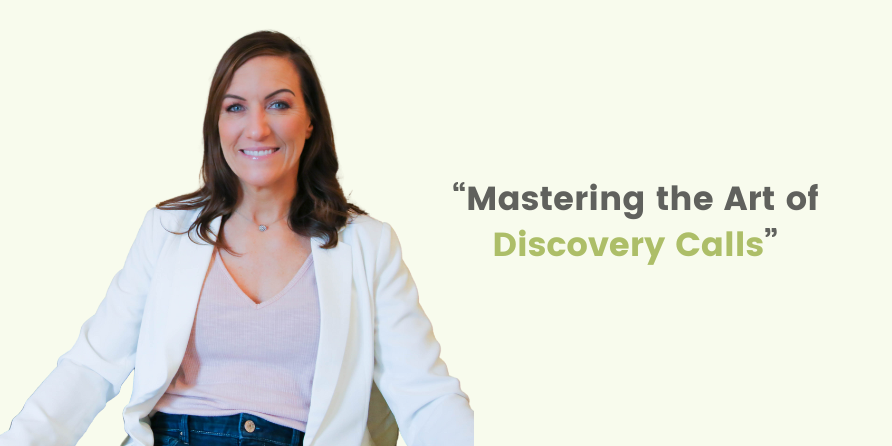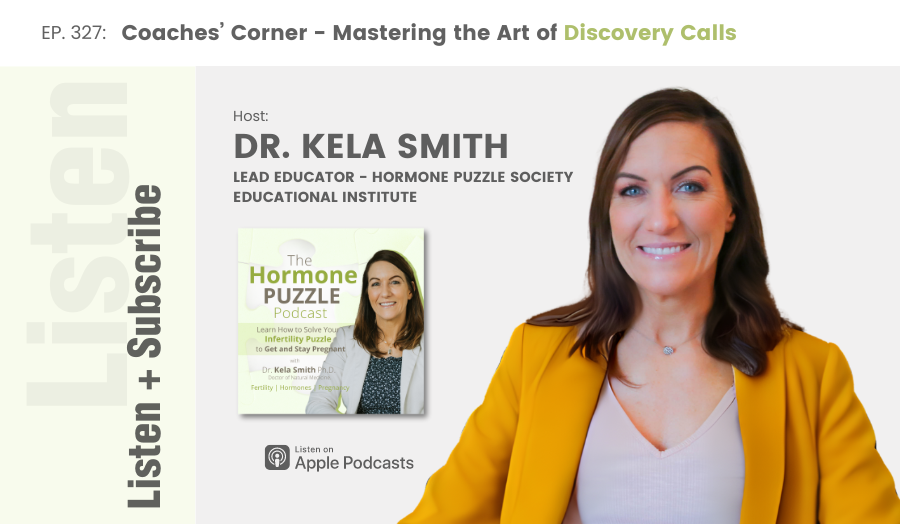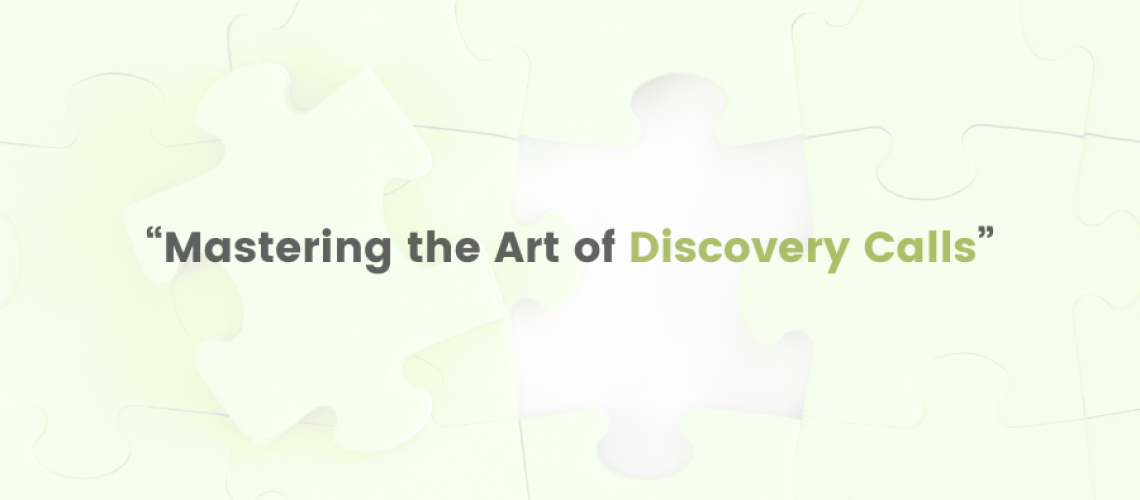We’ve turned one of our exciting podcast episode for coaches “Mastering the Art of Discovery Calls” into an easy-to-read blog post. Come explore valuable insights and knowledge with us, whether you prefer reading or listening. Let’s learn together on this journey!

In this episode of the Hormone Puzzle Podcast, I talked about a crucial aspect of your coaching business, and this is mastering the art of discovery calls. Whether you’re a seasoned coach or you’re just starting out, this episode is going to provide you with very valuable insights, which will help you to conduct an effective and impactful discovery call that will result in closed sales and new clients.
This is one of the most important skills that you can master as a fertility coach, because without clients, your business will not survive and there’s definitely an art to this and that’s what I hope to teach you here today.
These are the same strategies that I’ve used for over nine years in my business and I’ve built a successful multi six figure practice from scratch and I know sometimes discovery calls can be scary and it’s completely normal to be nervous and But just like any skill, with practice and polishing your technique, you will be doing discovery calls with ease in no time.
The importance of discovery calls
These calls are the foundation of building a successful coaching relationship with your potential clients. These initial conversations are not just about assessing potential clients, but they’re the opportunity for both of you, you and the client, to determine if you’re a right fit for each other.
And one of the main things that a discovery call does in the beginning is it establishes trust. The first call is going to set the tone for your entire relationship. I’m sure you’ve heard the phrase, there’s You can’t make a first impression twice, and that is so true. This is your chance to build rapport and trust and get that know, like, and trust factor so that you start on the right foot and it just continues with an amazing coaching relationship.
So on the call, some basic things you want to be thinking about is first you want to assess the needs of the potential client or patient. You want to understand your client’s unique situation, their challenges, their goals, and all of this information will help you to tailor your approach so that you can offer the best support possible.
You also want to set expectations at the beginning of the call. You want to clarify what your coaching involves and what this call is going to entail. You want really talk to the potential client about the commitment required and what a client can expect from working with you. And this will ensure that there’s no surprises down the road and everybody’s on the same page.
Even before the call, I will send a detailed intake form so I am prepped with information about the client even before the call begins. And I feel a potential client’s ability to fill out this form will show me how serious they are about meeting with me. I’ve even canceled calls before. If somebody doesn’t take time to fill out a form, my thoughts are if they can’t take five minutes to fill out a simple form, they’re probably not going to enroll in a 12 week coaching program that takes time, money, and effort.
And this is your choice. If you want to be strict like I am, and in the beginning, I know it’s easier to just let it slide when somebody doesn’t fill out the paperwork or do the things you asked them to do before getting on a call with you. However, as you grow and your time becomes more valuable, you really have to prioritize the people that are fully committed to transformation and to working with you.
And the commitment, I believe, starts with their ability to fill out an intake form. So during the call, I’m going to ask the potential client to share their story with me. And then I ask questions based on what I see on the intake form and what they tell me. I make sure to show them how my services can help them solve these problems that they’re telling me that they have.
Now, obviously, this is only true if the information you gather, you actually can help that person. But I go into the call knowing if I can help somebody or not, and I explain that to them as we’re on the call.
And you’re not going to be able to help everybody. And so that’s why it’s so important that you go in armed with the knowledge of what the person is struggling with, how long they’ve been struggling, their age, and all the factors that you need to make a choice as to whether you feel you can help this person or not.
And if you can’t, then have a plan in place for referring them to somebody, another practitioner that might be more suited to their needs. So as you start to think about discovery calls, the first piece of this is you really want to make sure you’re prepared.
The key to successful discovery calls is laying some foundational groundwork and really being prepared.
So the first piece of this is research, and so I already kind of talked about a little bit, but use the intake form information that the potential client has provided to you, and make sure you spend some time, one, spend some time creating a great intake form, and two, Some of the questions that I have on my form are around age, location of the client, how long they’ve been trying to conceive, the conditions that they might have, their ability to enroll today if they find we’re a fit for each other, and really familiarize yourself with the case.
Before you get on the call so that you’re prepared and that you can show genuine interest in helping them to solve this very painful issue. The next thing is make sure that you create a comfortable environment. You want to be in a quiet, professional setting. You want it to be free from distractions, free from noise.
You want to show up on time and end on time. This all shows respect for the client’s time and it also helps you to stay focused. For my free discovery calls, calls that I do in the U. S., I do those over the phone. And for international calls, I do that over Zoom. For paid discovery calls, it’s always done over Zoom.
At the beginning of the call, I also will set an agenda. I want the potential client to feel that there’s a structure to my calls and they know exactly what’s going to happen and when. And typically, I’ll include an introduction briefly of myself. I will ask them a few get to know you questions. Where are you calling from?
How did you find me? And then I just ask them to share their story with me. And while they’re doing that, I’m actively listening so I can ask relevant questions. And when we finish our conversation, that’s when I explain my services, how they fit the potential clients needs. And then I also will do a short little question and answer session.
I try to keep my discovery calls with questions that pertain to my services, not necessarily just the free for all where the potential client can ask me anything, I always lead back to, that’s a great question, this is something I work with my clients and patients on, and if we decide to work together, we’ll, we’ll work on that.
You want to keep your calls short and to the point. I think I just said that, but just reiterating that. I usually try to stay under 30 minutes max. I find 20 to 30 minutes is a great time for a free discovery call. Now, if it is a paid call, I will usually do 30 to 45 minutes because that potential client is paying me for my time.
Now, my paid discovery calls are a lot more in depth. I actually had them fill out a 57 page. health history form and I look at all their lab tests before we have a call. So it’s a lot more in depth and so therefore they’re paying me for my time. But today, we are talking about free discovery calls. So I’m going to keep it around that topic. So now let’s talk about the actual call.
Tips for conducting a productive discovery call.
We’ve already kind of touched on these, but you want to start with a warm welcome. I always thank my client or my potential client for taking their time to have a call with me.
I make them feel comfortable and appreciated. A lot of times people come on these calls and they’re really nervous. So I just want to make them feel comfortable. I want them to feel like they’re just having a conversation. I ask a few rapport building questions again. Some of the things I’ll ask is where are you from?
How did you find me? What made you want to book a call with me? And then I ask open ended questions. I have the client share their story, but then I’ll ask questions like Can you tell me a little bit more about that? Tell me about your cycle. Tell me about your nutrition. Have you ever had functional lab tests? Tell me what your main goals and concerns are. Tell me about your partner’s health. Tell me about your sleep, your hydration. I really try to actively listen and pay close attention to their responses. I take really good notes. I want to make sure I acknowledge their feelings and their experiences. An active listening builds trust and demonstrates empathy.
So make sure that you are doing that, you know, appropriately. And then after I hear all of their, you know, the problems they’re struggling with, their pain points, what they’ve tried in the past, and once I have a clear understanding of this, I’ll explain how my coaching packages can help solve these issues.
I always highlight my unique approach. I talk about success stories. I talk about the benefits of working with me and my team. I also address concerns. I’m prepared to answer questions, especially when they’re hard questions. I pride myself on being transparent and honest, and those are key pieces to this budding relationship.
And then once I hear their story and I hear their concerns and I’ve asked all the questions that I need to formulate a plan and when I think I can actually help somebody, again, I go into the call kind of knowing this, but I just want to gather as much information as I can and, and if I feel they’re a good fit for my program, then I outline what working together would look like.
And I’ve done shows about how to package your programs in the past, I’m not going to get into detail with that here. Go back and listen to my other shows where I talk about packaging your programs. But I recommend that you have I would say no more than two programs. That’s what I do and I find that that’s easy for somebody to understand and it’s not too confusing.
A confused mind never buys. So the ones that I do are a labs only package which includes one call with me, plus a treatment plan,
The second package that I do is a 12 week intensive coaching package, which includes three of our most popular labs, plus a coaching, plus weekly coaching calls. It’s more intensive, it’s more support, it’s more customization. So really decide what works best for you and your niche. And the one caveat I have with all of this is make sure your programs are clear, concise, know how they’re different, how they can help the client, and what the pricing is.
Be able to just let that roll off your tongue and say it really easily so it makes it super easy for the person to make a decision and buy. And remember, your client is not buying a program or a package. They’re enrolling in a solution to their problem. People hire me to help them get pregnant, not to go through a 12 week program.
Or not to run lab tests. They want me to help them get pregnant. How we do that? That’s irrelevant. This is what they’re paying for – a baby at the end. So then at the end of the call, you want to outline the next steps. You want to outline the key points. Whether you schedule a follow up call or you send additional information. You want to make sure that they know what to do next. And so that’s where the follow up comes in.
The discovery call does not end when you hang up. You want to send a follow up email.
I try to do it within five to ten minutes of talking to the person unless I have another call right behind them. And then I’ll tell them on the phone, Hey, I’m going to send you a follow up email.
It’ll have everything that we just talked about. The packages, the pricing, how you can enroll. It’ll have a link for that. But I do have another call right after yours. So as soon as I get off of that call, At whatever time, you know, it is, I’ll give myself 30 extra minutes and I’ll say, I’ll send you this at three o’clock.
So give me a little bit of time. Let me do this next call and I’ll get that over to you by today. And they’re so thankful that you let them know that because then they’re not waiting for an email and then when it doesn’t come, they’re thinking, Okay, well, she said she was going to send this and it’s not here.
So again, whenever I send a recap email, I’ll thank the client for their time. I’ll briefly recap our discussion, then I’ll provide any additional information that they requested, and then I’ll outline my packages, my pricing, and a link to purchase. Super easy, very concise, so they know exactly what to do to move forward.
And this also will reinforce your professionalism and your commitment. Then after the call, you want to make sure that you write detailed notes and you outline those in your CRM. If you’re using a customer relationship management software, we use go high level. So whichever one you choose, I recommend that you do have something where you’re marking the call as you, you completed the call.
These are the notes about this person, what went well, what could have been improved. And then as you follow up with these people, you’ll have the notes, and so you can look back and say, I talked to Cindy about PCOS and she’d been trying to get pregnant for two years and she’s interested in one, one on one 12 week coaching program.
So then when you reach back out to her, I usually recommend one to two days after the call, you reach back out and say, Thank you so much for the call. I would love to work with you. What did you decide about working together? Did you want to move forward with our one on one package or whatever package she expressed interest in when you had the call?
And then that’s it! That is your discovery call. So mastering this skill and mastering the art of discovery calls is one of the most essential things that you can do to build a strong and robust business. It’ll allow you to build these know, like, and trust relationships. And by preparing thoroughly, conducting the call with empathy and professionalism, and following up efficiently, you’re setting the stage for a wonderful coaching practice.
Thank you for tuning in to today’s episode of the Hormone Puzzle Podcast. If you found this information helpful, please subscribe and share this with your fellow coaches. And also, if you love our show, please leave us a review. This is how more people will find the show and we can help more people just like you have amazing coaching practices.
Until next time, I’m Dr. Kayla Smith wishing you the best on your building of your coaching practice. So take care and keep solving those hormone puzzles. Thank you. And until next time, bye for now.
P.S.
Are you considering becoming a fertility coach or looking to grow and scale your current practice? I’ve created a comprehensive Fertility Coach Certification Course designed to provide you with the tools, knowledge, and support you need to excel in this rewarding field. If you’re ready to make a difference and empower others on their fertility journey, visit my website to learn more: www.hormonepuzzlesociety.com/education.
This article, “Mastering the Art of Discovery Calls” was originally published as a podcast episode on the show, The Hormone Puzzle Podcast.


